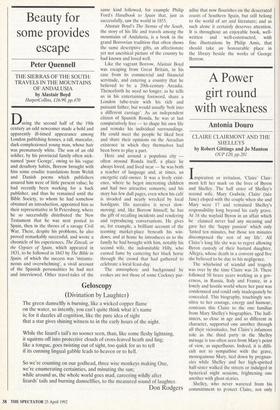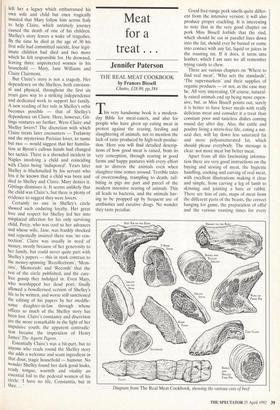A Power girt round with weakness
Antonia Douro
CLAIRE CLAIRMONT AND THE SHELLEYS by Robert Gittings and Jo Manton OUP f20, pp.281 Inspiration or irritation, `Claire' Clair- mont left her mark on the lives of Byron and Shelley. The half sister of Shelley's second wife, Mary Godwin, Claire (nee Jane) eloped with the couple when she and Mary were 17 and remained Shelley's responsibility long beyond his early grave. At 18 she waylaid Byron in an affair which he claimed never had any meaning and gave her the `happy passion' which only `lasted ten minutes, but those ten minutes discomposed the rest of my life'. All Claire's long life she was to regret allowing Byron custody of their bastard daughter, Allegra, whose death in a convent aged five she believed to be due to his negligence.
The whirlwind of scandal and tragedy was over by the time Claire was 24. There followed 50 brave years working as a gov- erness, in Russia, Italy and France, in a lonely and hostile world where her past was condemned and could only inadequately be concealed. This biography, touchingly sen- sitive to her courage, energy and humour, contrasts this Claire to the one familiar from Mary Shelley's biographies. The half- sisters, so close in age and so different in character, supported one another through all their vicissitudes, but Claire's infamous role as the third party in the Shelley menage is too often seen from Mary's point of view, as superfluous. Indeed, it is diffi- cult not to sympathise with the grave, monogamous Mary, tied down by pregnan- cies while Shelley and her high-spirited half-sister walked the streets or indulged in hysterical night sessions, frightening one another with ghost stories.
Shelley, who never wavered from his committment to protect Claire, not only
left her a legacy which embarrassed his own wife and child but once tragically insisted that Mary follow him across Italy to help Claire, which untimely journey caused the death of one of his children. Shelley's story leaves a wake of tragedies. By the time he died at the age of 30 his first wife had committed suicide, four legit- imate children had died and two more which he felt responsible for. He drowned, leaving three unprotected women in his household — Mary, Jane Williams and Claire Clairmont.
But Claire's story is not a tragedy. Her dependence on the Shelleys, both emotion- al and physical, throughout the first six Years gave way to a striking independence and dedicated work to support her family. A new reading of her role in Shelley's orbit becomes possible — that of Shelley's dependence on Claire. Here, however, Git- tings ventures no further. Were Claire and Shelley lovers? The discretion with which Claire treats later encounters — Trelawny and the mysterious Parisian lover, to name but two — would suggest that her humilia- tion at Byron's callous hands had changed her tactics. There is a shrouded incident in Naples involving a child and coinciding with Claire being 'indisposed'. Years later Shelley is blackmailed by his servant who lets it be known that a child was born and died to Shelley and Claire. Mary denies it. Gittings dismisses it. It seems unlikely that the child was Claire's, but there is plenty of evidence to suggest they were lovers.
Certainly no one in Shelley's circle showed such enduring loyalty. Her great love and respect for Shelley led her into misplaced affection for his only surviving child, Percy, who was cool to her advances and whose wife, Jane, was frankly shocked and repeatedly insisted there was `no con- nection'. Claire was usually in need of money, mostly because of her generosity to her family, but could never quite part with Shelley's papers — this in stark contrast to the money-spinning 'Recollections', 'Mem- oirs', 'Memorials' and 'Records' that the rest of the circle published, and the care- free gossip they indulged in. Even Mary, who worshipped her dead poet, finally allowed a bowdlerised version of Shelley's life to be written, and worse still sanctioned the editing of his papers by her meddle- some daughter-in-law through whose offices so much of the Shelley story has been lost. Claire's constancy and discretion are the more remarkable in the light of her Impulsive youth; the apparent contradic- tion became the inspiration of Henry James' The Aspem Papers.
Essentially Claire's was a bit-part, but to anyone who reads round the Shelley story she adds a welcome and scant ingredient in that dour, tragic household — humour. No wonder Shelley found her dark good looks, ready tongue, warmth and vitality an essential foil to the pedestal women of his circle: 'I have no life, Constantia, but in thee...



























































 Previous page
Previous page